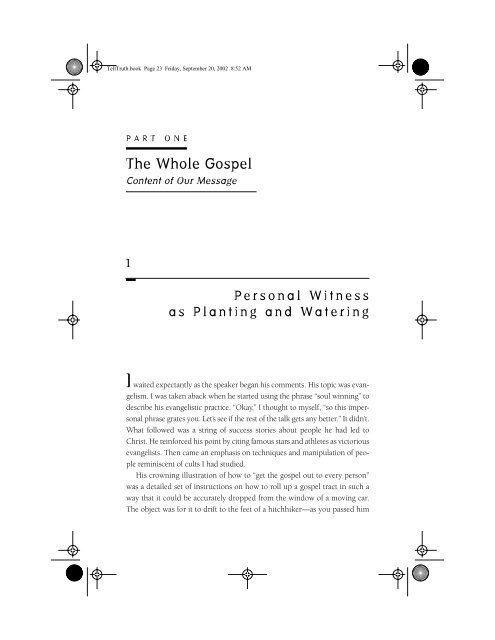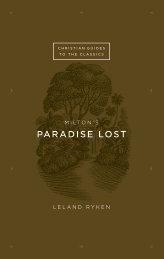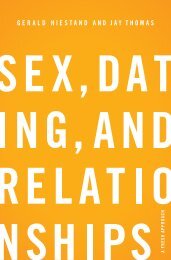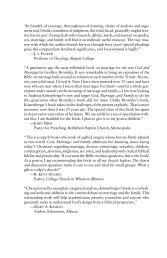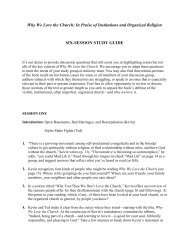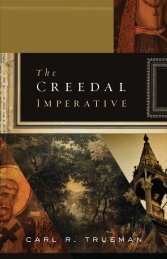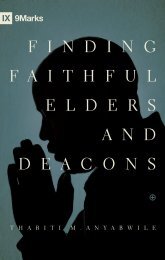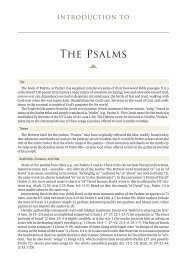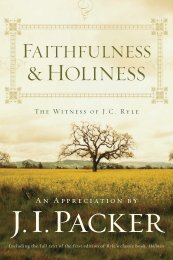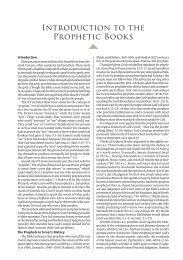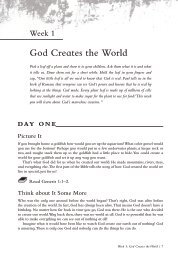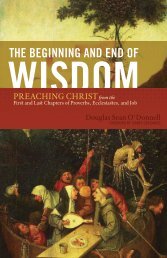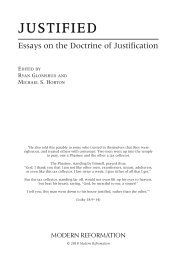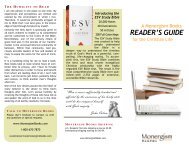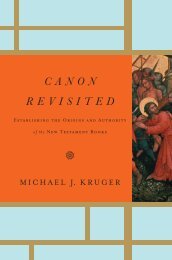Chapter 1 - Monergism Books
Chapter 1 - Monergism Books
Chapter 1 - Monergism Books
Create successful ePaper yourself
Turn your PDF publications into a flip-book with our unique Google optimized e-Paper software.
TellTruth.book Page 23 Friday, September 20, 2002 8:52 AMPART ONEThe Whole GospelContent of Our Message1Personal Witnessas Planting and WateringI waited expectantly as the speaker began his comments. His topic was evangelism.I was taken aback when he started using the phrase “soul winning” todescribe his evangelistic practice. “Okay,” I thought to myself, “so this impersonalphrase grates you. Let’s see if the rest of the talk gets any better.” It didn’t.What followed was a string of success stories about people he had led toChrist. He reinforced his point by citing famous stars and athletes as victoriousevangelists. Then came an emphasis on techniques and manipulation of peoplereminiscent of cults I had studied.His crowning illustration of how to “get the gospel out to every person”was a detailed set of instructions on how to roll up a gospel tract in such away that it could be accurately dropped from the window of a moving car.The object was for it to drift to the feet of a hitchhiker—as you passed him
TellTruth.book Page 24 Friday, September 20, 2002 8:52 AM24 T ELL THE TRUTHby! He justified this technique on the basis of the startling story of a youngman who was converted by this sort of “gospel bomb.” The speaker’s conclusion,“It works,” sounded to me like the unbiblical idea “the end justifiesthe means.” As I left the church that night I wondered, Instead of sending hisSon, why didn’t God just send a tract?Perhaps closer to your experience is the evangelistic approach of majoringon the conscious (felt) needs of people (loneliness, lack of love, hurt,stress, discouragement and so on) and molding Jesus into a supplier of theirdesires. Often the deep sinful nature of their selfishness is never addressed.Well-meaning Christians dilute the gospel into a bandage for surfacewounds and medicine for selfish wishes. The deeper need of reconciliationwith their Maker on his terms of unconditional surrender is omitted. Legitimatedesires (to be loved, have health, not be lonely) can become idols.WHAT IS WITNESSING?We have good cause to wonder what kind of a gospel is being conveyed inour day. I am referring not only to individual speakers (this man was a professorof evangelism at a Christian school) but to seminars and books thatpurport to train Christians in evangelism. I’m embarrassed at the shoddymethods and anemic view of God prevalent among evangelicals. We need agrowing concern for a God-honoring witness to his grand gospel. Before wecan make any headway, however, we should define our terms. What do wemean by evangelism and witness?In thinking of witnessing, we have to walk between a narrow and a broaddefinition. Narrowly defined, witnessing is confined to a rehearsal of a fewgospel facts in the hearing of a nonbeliever. Broadly defined, it is whateverwe do as Christians before the watching world. Neither of these definitionsis satisfactory. The first narrows witness to only our lips; the second broadensit to just being nice. Both our words and our ways are inextricably boundtogether in witness. It is easy to excuse ourselves by saying either “Well, Itold her the gospel!” or “I just live my life before others.” These two extremesseem to have developed more in reaction to each other than on any biblicalbasis. What might be a more balanced view?The main design for each man and woman is not “to be a super soul-
TellTruth.book Page 25 Friday, September 20, 2002 8:52 AMP ERSONAL WITNESS AS PLANTING AND WATERING 25winner night and day.” As the Westminster Catechism says, it is “to glorifyGod and enjoy Him forever.” This means that we, as whole people, are toenjoy God, starting now, and keep his honor in focus in all that we do.Clearly the way we live is a primary aspect of our witness. Yet our life is tobe coupled with telling God’s truth. People need to be told who makes ourlives different. Our lives, then, will illuminate the truth we express to nonbelievers.The airplane of Christian witness has two wings: our lives (conduct)and our lips (conversation).To remain silent and let others interpret our actions is wrong; God himselfdid not do this. The pivotal points of God’s redemptive action in historyare accompanied with verbal revelation. God wants us to understand themeaning of his actions. Likewise, we must speak—and speak of Christ—even if we sense our own inconsistency of life. We must speak even whenwe do not know much about the Bible. We must speak even when it is inconvenient.God is bigger than our sins, our ignorance, our pride. He willhonor his word in our mouths.Nevertheless, at times our actions do speak louder than our words. WhenJohn describes our commission to witness, he says that as the Father sent theSon, so we are sent to others (Jn 20:21). God didn’t send a tract; he prepareda body. Likewise, God has prepared your life and personality to demonstratehim. We need to be creative and selfless in our love to others. We need to learnhow to be friends as well as perceive the needs of others and do something forthem. Much of Jesus’ witness was in response to a question following an act ofkindness or a miracle. But we need to make sure that we are not condescending.We should allow others to help us, let them minister to us. Jesus askedthe Samaritan woman to give him some water. We need to learn to be humanand treat others as God’s image-bearers. If we are friendly only as long assomeone is interested in discussing the gospel, we don’t know much aboutfriendship. We need to listen and seek to serve, not just talk.How does the Bible define witnessing? In the Great Commission as expressedby Luke, we have central truths to which we are witnesses (Lk24:48). At the ascension, Christ’s last words command the disciples to witnessabout him, a person (Acts 1:8). In the Gospels we see the writers selectingincidents from the life of Christ to convey the gospel. The background
TellTruth.book Page 26 Friday, September 20, 2002 8:52 AM26 T ELL THE TRUTHfor the word witness is the law court. To witness is to testify that Christ is whohe said he is. Such testimony is a means to an end—to give an eyewitnessaccount of the truth (1 Jn 1:1-3).Studying in the Swiss Alps at L’Abri in the 1960s with Francis and EdithSchaeffer, my wife and I had little idea that God would use us to help someonefind God’s grace. A young man, Chris, arrived one afternoon when ourcommunity was working in the gardens and carpentry shop, cleaning andcooking. He was a student of religion at the University of Pennsylvania, touringEurope to learn about life. He eagerly joined in with those of us from everycontinent who had come to search for truth. He liked the intellectualstimulation, friendliness and high morals, and seemed confident in himself.In this man’s eyes, Jesus was intriguing but unnecessary to living the goodlife. One day I asked him to read Paul’s account of why he had transferredhis confidence from self-righteousness to a gift-righteousness. Ponderingthis question, Chris began to spend time alone, reading Scripture and askingGod to make Christ real to him. Later that summer we parted with a promiseto see each other back in Philadelphia.At the same time that I was getting to know Chris, a young womannamed Franny, whom I knew from Philadelphia, was also studying at L’Abri.Franny had been raised in a reputable New England family and had movedto Philadelphia two years previously. Following her religious upbringing wasimportant to her, so she sought out a church with the refined atmosphereand high liturgy to which she was accustomed. It wasn’t long before hercousin, who had become a Christian, contacted her and introduced her tohis Christian friends. Providentially, one of them belonged to a group of studentsat Westminster Theological Seminary who had a burden for evangelism.Each Sunday these students would invite friends to church and thento the pastor’s home that night for a discussion. Franny protested that if anyonewas a Christian, she certainly was.Slowly, however, realization of her unbelief began to dawn on her. In herown words, “I found myself confronted with my self-delusion at eachchurch service as I said the Apostles’ Creed. I got to a point where, after Ibegan ‘I believe in God the Father Almighty,’ I became silent for the rest ofthe recitation. I admitted I didn’t believe anything else in that creed. I had
TellTruth.book Page 27 Friday, September 20, 2002 8:52 AMP ERSONAL WITNESS AS PLANTING AND WATERING 27come to realize that my supposed faith was nothing more than a cultural tradition—awarm nostalgia.”She began to search in earnest. Again in God’s providence, he brought aspeaker and author to the city—and he was from her religious tradition! Hisname was J. I. Packer. Eagerly she attended his lectures on the epistle to theEphesians. She was dumbfounded by the depth and richness of Scriptureand by the fact that her own church (Episcopal) had once been united inteaching the importance of new birth. At the meetings she was introducedto a Baptist business executive who mailed her a copy of Bishop J. C. Ryle’sbook on the confessional statement of her church (The Thirty-Nine Articles),which she began to read. Several weeks later, Franny called me. “Could youcome to my apartment as soon as possible? This is all making sense. I believe!I want to talk to you.” This is the background that later led to her visitto L’Abri with two of her Christian girlfriends.While at L’Abri, Franny caught Chris’s eye, and they agreed to see eachother back in Philadelphia. Since I was serving the students at the Universityof Pennsylvania through InterVarsity Christian Fellowship, Chris joined thegroup and started going to church. He and Franny, both new Christians, beganto date and soon were married. As the years have passed, our friendshiphas continued. In a unique twist to this story of evangelism, Chris joined thestaff of InterVarsity Christian Fellowship and is now my supervisor! How Ilong for those reading this book to be used by God in bringing others toChrist. Aside from worshiping God, there is nothing else in this world thatis more deeply fulfilling.THE DIFFERENCE BETWEEN THE GOSPEL AND OUR TESTIMONYThe content of our message is Christ and God, not our journey to faith. Ourpersonal testimony may be included, but witnessing is more than recitingour spiritual autobiography. Specific truths about a specific person are thesubject of our proclamation. A message has been committed to us—a wordof reconciliation to the world (2 Cor 5:19).Good evaluation questions to keep in mind after hearing a testimony are“How much did I learn about Christ? How much about the speaker? Whichwas more prominent?” When people are very much in love, you find them
TellTruth.book Page 29 Friday, September 20, 2002 8:52 AMP ERSONAL WITNESS AS PLANTING AND WATERING 29aries who have seen no converts from years of labor would have to be rebukedfor lack of witnessing. To define evangelism in terms of results is toobroad. Then its essence becomes a quantitative measurement: if there areno results, then no evangelism has been done. I do not mean to suggest weshould not evaluate both our results and nonresults, building a holy dissatisfactionwith nonresults. We are not content with never catching anyfish when fishing (Lk 5:4-11) or having empty seats at God’s kingdom banquet(Lk 14:15-24). Have you ever pleaded for lost people with deep sorrowas did Jesus and Paul? Have you wept?It is just as misleading to narrow our definition of evangelism to the type ofmeeting, literature, appeal or Bible passage used. If we did this, then we wouldbe embarrassed to find little evangelism done in the New Testament times. Canyou find a biblical example of the methods employed in today’s typical evangelisticrally and appeal? 3 Rather, we need to evaluate all supposed evangelismby the question “What truth was taught?” If we think wrongly about our definitionof evangelism, we are likely to act wrongly in our methods of evangelism.(See appendix A.IX.)In the Bible we have many examples of witnessing from which we candraw numerous principles. Studying the way Jesus interacted with peopleand the way the apostles witnessed in the Spirit can help in our own witness.From these models of witnessing, however, I will mention only one. Thepassage is an account of Paul’s witness before Agrippa (Acts 26:16-29), andit highlights the characteristic of bold, conscience-directed speech.Paul describes himself as appointed by God as a servant and a witness (agood combination to keep in mind). In a series of striking contrasts, the goalof his mission is summarized as nothing less than conversion. Repentanceand evidence of it are his major concerns. Paul centers on fulfillment ofScripture and Christ’s death and resurrection. He speaks to Agrippa’s conscience—anelement often neglected in witnessing. Genuine witnessing involvespersuading people to convert but stops short of evaluating thesuccess only in terms of results.There are two main ways that we can study the presentation of the gospel.First, we can study the Bible itself, especially the book of Acts, the Epistlesand the life of Christ. Second, we can study the history of the Christian
TellTruth.book Page 30 Friday, September 20, 2002 8:52 AM30 T ELL THE TRUTHchurch. That is, we can look at the revivals and, in particular, the peoplewhose preaching has been honored in the conversion of others. From suchstudy, Martyn Lloyd-Jones has drawn the following foundational principlesfor evangelism:1. The supreme object of the work of evangelism is to glorify God, not tosave souls.2. The only power that can do this work is the Holy Spirit, not our ownstrength.3. The one and only medium through which the Spirit works is the Scriptures;therefore, we “reason out of the Scriptures” like Paul did.4. These preceding principles give us the true motivation for evangelism—a zeal for God and a love for others.5. There is a constant danger of heresy through a false zeal and employmentof unscriptural methods. 4Understanding that God, not us, is the evangelizer (the one who bringsresults) is wonderfully liberating. This makes witnessing an adventure inwhich we merely ride along with God as he moves out. We don’t force openany doors, just walk through the ones he opens! In The Lion, the Witch, andthe Wardrobe, C. S. Lewis allegorically describes the sensation of riding onChrist (symbolized as the lion Aslan) over the wall into the enemy’s territory,as he confronts the power of sin to bring rebirth.“And now,” said Aslan presently . . . “we have a long journey to go. You mustride on me.” . . . And with a great heave he rose underneath [the children] andthen shot off, faster than any horse could go, down hill and into the thick ofthe forest.That ride was perhaps the most wonderful thing that happened to them inNarnia. Have you ever had a gallop on a horse? Think of that; and then takeaway the heavy noise of the hoofs and the jingle of the bits and imagine insteadthe almost noiseless padding of the great paws. Then imagine instead ofthe black or grey or chestnut back of the horse the soft roughness of goldenfur, and the mane flying back in the wind. And then imagine you are goingabout twice as fast as the fastest racehorse. But this is a mount that doesn’tneed to be guided and never grows tired. He rushes on and on. . . .
TellTruth.book Page 31 Friday, September 20, 2002 8:52 AMP ERSONAL WITNESS AS PLANTING AND WATERING 31It was nearly midday when they found themselves looking down a steephillside at a castle. . . . No face looked over the battlements and the gates werefast shut. And Aslan, not at all slacking his pace, rushed straight as a bullettowards it. . . .Next moment the whole world seemed to turn upside down, and the childrenfelt as if they had left their insides behind them; for the Lion had gatheredhimself together for a greater leap than any he had yet made and jumped—oryou may call it flying rather than jumping—right over the castle wall. 5Here’s a story of how I rode on God’s back (and the prayers of a Christianfamily). It all began with a father who was concerned about a college studentwho wanted to date his daughter. Since the young man was not a believer,the father and daughter agreed that the only “date” would be on Sundaymornings at church. They told him to come talk to me about the Lord—andhe did!I was skeptical as a lanky Colombian with a ponytail settled on the sofain my office. One hour and forty minutes later, I had become hopeful andencouraged by his interest in spiritual things and the Bible. He had alreadybeen attending a good church for three months; God’s Spirit was definitelyworking. As I told him the story of the conversion of two “religious” men—Paul and the rich, moral young man—a light seemed to come on. He tooconsidered himself religious and moral, but now he saw his pride, hypocrisyand guilt before a holy and loving God. I repeatedly warned him not to playwith God in order to win favor with this Christian young woman.Two weeks later Pablo came to tell me his story. When he left my officeafter the first visit, he went to a park for several hours and read his Bible,thought, prayed and reviewed the Scriptures we had gone over, and eventuallyrepented of his sin. He said:The next day I was changed. I felt joy, peace, forgiveness. Before, I only sawreligion as mental acceptance of certain historical facts: Jesus lived in the MiddleEast; Jesus rose from the dead, etc. Now I feel the meaning of those facts.That night my friends were drinking and had rented a porno video. As soonas I realized what it was, I couldn’t stay in the house. I got up and left. Jesuswould not want me to watch this. They were shocked and worried about me.I didn’t know how to explain to them. But they know I’m into God now and
TellTruth.book Page 32 Friday, September 20, 2002 8:52 AM32 T ELL THE TRUTHare suspicious, yet curious.Later, I wrote a letter to a friend, who has a good job and money but is depressedand lonely, telling her what I had found: “Jesus is the Savior for oursins.” She thinks I’m just young and have a Christian girlfriend, and I’ll growup someday.Every day now I’m God-conscious. When I read the Bible, it’s like I’m listening;it seems to be speaking to me and taking me somewhere. I am muchmore aware of my sin now, but also of my sorrow for sinning before God(Psalm 51), and have experienced release from guilt. As I face temptations daily,I’m surprised at how I can now resist some of them. I feel strangely stronger.God has become more important than my career plans and the girl that Ilike. I could never meet all her needs and vice versa. Each of us needs God tobe number one. It seems that God has even arranged our summer so that wewill see very little of each other for 2 months. This is good. I have a lot of readingand evaluating to do.I love to ask new babes in Christ, “What’s it like?” and just listen. Ofcourse, I’m comparing it with Scripture—especially 1 John, which was writtento give the marks of true salvation and assurance. I avoid telling themthey are saved. The Holy Spirit gives assurances as they see the fruits of achanging life. How thankful I am for the prayers and wisdom of the Christianfamily who took Pablo to church and for a church that gives the gospel“straight.” Wow! Will you pray and speak to someone today? Invite them tochurch?I have begun this examination of evangelism by describing the idea ofwitness. Now let’s shift to a scriptural study of what constitutes the “wholegospel.” We’ll do this both negatively (by way of contrast with a partial gospel)and positively (by way of presenting an outline and commentary on thecentral elements of the gospel).


